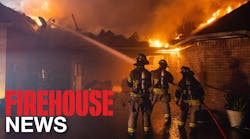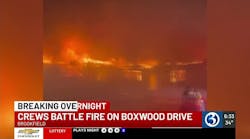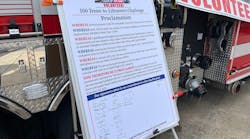Department of Homeland Security officials initially provided few specific reasons for the alert, which will set in motion a series of security measures around the federal government. It also advises cities, states and businesses to take extra security measures.
Chief spokesman Ari Fleischer said President Bush's homeland security council decided to raise the terror alert warning during a meeting at the White House. After their session, Bush was informed of the council's decision _ which is binding and takes immediate effect _ by chief of staff Andrew Card at 1:50 p.m. EDT.
The alert was raised after top administration and counterterrorism officials reviewed intelligence reports suggesting domestic terrorist attacks were possible.
The new level, orange, marks a high threat of terrorist attacks. It's the second highest level on the five-color scale. The previous level, yellow, marked an elevated risk.
Counterterrorism officials had previously described the bulk of the terrorism intelligence as pointing toward attacks overseas.
Officials believe al-Qaida has launched a series of strikes, loosely coordinated by the organization's top leadership, aimed at demonstrating al Qaida is still viable. They believe attacks in Morocco and Saudi are part of this.
The administration has raised the terror alert level one notch three times previously, setting off a flurry of increased security measures by cities, states and businesses. Each time, the level was lowered back to yellow after a few weeks.
During the alerts, no domestic attacks were apparently attempted, leading some to question whether the orange alerts do anything more than frighten the public and cost taxpayer dollars, particularly in parts of the country where terrorist attacks are unlikely.
However, Homeland Security officials say heightened security can stop attacks without authorities realizing it _ a would-be terrorist may pass on striking a target when he sees the extra guards.
The last time it was raised was during the Iraq war. It went down after most hostilities ended.
Speaking to reporters while administration officials were considering raising the level, Senate Armed Services Committee Chairman John Warner, R-Va., said ``I think Americans should give heed and pay attention to what they decide.''
``We do not know the specificity of where a strike could or could not come, but I think prudent measures are being taken by the president on down, by his administration,'' Warner said.
The alert system is designed to guide law enforcement agencies, businesses and the general public in their security decisions, and it is mostly up to local governments and companies to decide what measures to enact.
It is driven by world events and information gathered by U.S. intelligence agencies, such as monitored communications between terrorists. This ``chatter'' sometimes spikes before an attack.
Officials say they want to take the alert level to orange only after receiving specific, credible information that attacks are planned.
``We have concerns about whether or not there are threats that go beyond Saudi Arabia,'' Fleischer said earlier. ``These matters are being looked at as we speak. We do have concerns about terrorists doing what they can to continue to inflict harm.''
The FBI, in an advisory sent Friday to state and local law enforcement agencies, had said the al-Qaida terrorist organization remains active and could hit U.S. and Western targets overseas as well as those on American soil.
The agency sent out another version of the bulletin earlier Tuesday. It repeated the same warning, but also said FBI has reason to believe the ``Saudi Arabia and Morocco attacks (are) a possible prelude to U.S. attacks,'' according to law enforcement officials speaking on condition of anymity.
The FBI is assisting Saudi authorities in the investigation of the bombings on three Saudi housing compounds that killed 34 people, including eight Americans. Al-Qaida also is suspected in another series of bomb attacks Friday in Casablanca, Morocco, that killed 41 people.
The bulletin says the Saudi attacks featured ``traditional hallmarks of al-Qaida operations'' such as precise planning, surveillance and coordination among several teams. Each bombing involved a sedan followed by a truck or sport utility vehicle laden with explosives, with gunmen used to attack guards and overcome security measures.
Related Links Suggested by ICHIEFS:
- Refer to the IAFC Web site for Fire Service recommended actions for respective threat levels at http://www.iafc.org/downloads/hscoloralert.pdf
- For more information on the Homeland Security Advisory, visit the U.S. Department of Homeland Security Web site at www.dhs.gov
- For citizen protection and preparedness recommendations, visit the Red Cross Web site at www.redcross.org
- For information on the FBI Terrorist Threat Integration Center, go to





